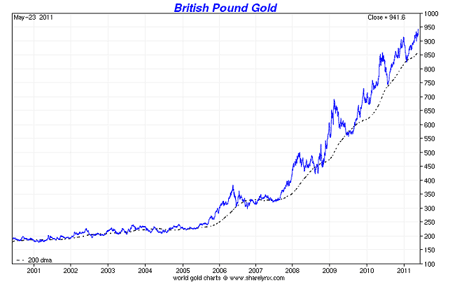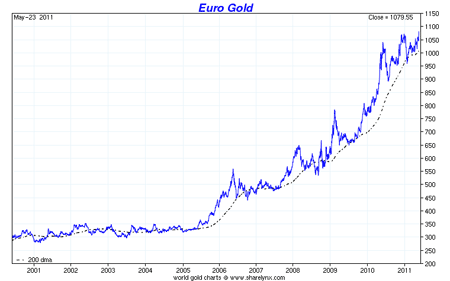Gold will hit £1,000 an ounce by October
In terms of the US dollar, the gold price has been slipping back since touching a record high of $1,575 an ounce. But it's a different story in sterling. Gold continues its rise, and will hit £1,000 an ounce before the year's end, says Dominic Frisby.
Get the latest financial news, insights and expert analysis from our award-winning MoneyWeek team, to help you understand what really matters when it comes to your finances.
You are now subscribed
Your newsletter sign-up was successful
Want to add more newsletters?

Twice daily
MoneyWeek
Get the latest financial news, insights and expert analysis from our award-winning MoneyWeek team, to help you understand what really matters when it comes to your finances.

Four times a week
Look After My Bills
Sign up to our free money-saving newsletter, filled with the latest news and expert advice to help you find the best tips and deals for managing your bills. Start saving today!
At the beginning of May, gold touched $1,575 an ounce, a record.
It's been in a downtrend ever since.
At least, that's assuming you look at the dollar price of gold.
MoneyWeek
Subscribe to MoneyWeek today and get your first six magazine issues absolutely FREE

Sign up to Money Morning
Don't miss the latest investment and personal finances news, market analysis, plus money-saving tips with our free twice-daily newsletter
Don't miss the latest investment and personal finances news, market analysis, plus money-saving tips with our free twice-daily newsletter
But for sterling investors it's a different story.
In fact, gold has broken out to new highs, just this week.
For British investors, the dollar price of gold is noise
There are only two prices that matter to an investor, goes the old saying - the price you buy and the price you sell. Everything else is just noise.
In many ways, for a UK-based investor, the dollar price of gold is noise. We bought our gold with pounds, for the most part, and we'll most likely sell it for pounds, (assuming they still exist when we do come to sell).
Yet we are obsessed with the dollar price of gold. Silly us.
Here is a chart which shows gold since 2001, priced in sterling (the dotted line is the 200-day moving average). During the first part of the decade the pound was relatively strong on the forex markets it shows you just how irrational markets can be and gold's gains against it were only gradual. In autumn 2005, however, that changed and the price gains suddenly accelerated.Gold has since maintained that faster pace.

What I like about this chart is that, although the sell-offs since 2005 and we seem to get one or two a year are violent, it is actually quite an orderly uptrend, with a clear channel in place. We now stand just shy of £950 an ounce. I'm confident we'll see £1,000 gold before the end of the third quarter.
Sir Isaac Newton, who, as Master Of The Mint, put us on a gold standard in 1700 with a pound around a quarter of an ounce, must be turning in his grave not that Mervyn King will care.
A warning from Belarus
Gold is also breaking out to new highs against the euro. The euro price of gold now stands at €1,080. Here's a chart. We see that similar pattern of acceleration which began in 2005 (again, the dotted line is the 200-day moving average).

Despite these high prices, if I were a Greek or a Portuguese citizen I would make going to the coin shop tomorrow morning a top priority, given everything that's going on.
Just this week the government of Belarus did what I am sure the Greek, Irish and many other governments would like to be able to do and may be forced to do, should they drop out of the euro. It devalued the Belarus rouble by some 30%.
On Tuesday, the National Bank of Belarus set the official exchange rate at 4,930 Belarusian roubles per US dollar, whereas the day before it fetched 3,155. (The freely-traded interbank rate stands at about 7,000 roubles).
The Belarusian citizens are now paying for their government's failings with the destruction of their money. Why should they? It's not right. But that's governments and their fiat money for you.
But any Belarusians who owned gold and silver have just seen their purchasing power increase by something like 60% overnight. They have protected themselves and preserved even increased their purchasing power.
"Thanks to a large trade deficit and rapidly falling hard currency reserves" says the BBC, Belarus "faces a serious financial crisis". Sound familiar?
This is a global problem. It was Belarus the week. The day is not far away when it will be someone bigger. As Paul Tustain of Bullionvault is so fond of saying, most countries face either "a market-driven collapse or an austerity-driven collapse". With current global levels of debt and deficit, one or the other is inevitable.
Britain's credit rating comes under threat
And it may come sooner than we think. This week China's Dagong credit rating agency downgraded the UK's credit rating from AA- to A+, putting us on a par with Chile, Belgium and the US, which Dagong downgraded in November. (If I was Chile, I'd be rather miffed). And sterling is beginning to slide once again.
The easiest route out of this debt crisis has been for governments and central banks to devalue their money and they will continue to do so, as long as markets and people let them.
We have 4.5% inflation, officially, although we all know it's much higher than that. This time last year the Bank of England said it would be 1.75%. They say it will fall next year. How do they know? Why should we give them any credence at all, when they keep getting it wrong?
Why are they not putting up rates? Because they have decided that debtors can't take it. They'd sooner devalue the currency. It's the path of least resistance.
Well, let them if they want to. Buy gold instead. Stop using their money, if they're intent on destroying it. They can go on as long as they like. Gold will keep rising until they stop.
And when they do stop, you'll be able to buy a lot more with your gold than you can now.
Just like the gold-holders of Belarus.
Our recommended article for today
How do you know when to sell shares?
If you are looking to buy shares, there's no shortage of advice around. But what's sometimes less clear is how and when to sell. Getting that right is vital, says Tim Bennett. Here, he gives three tips on how to tell when it's time to sell.
Get the latest financial news, insights and expert analysis from our award-winning MoneyWeek team, to help you understand what really matters when it comes to your finances.
MoneyWeek is written by a team of experienced and award-winning journalists, plus expert columnists. As well as daily digital news and features, MoneyWeek also publishes a weekly magazine, covering investing and personal finance. From share tips, pensions, gold to practical investment tips - we provide a round-up to help you make money and keep it.
-
 Should you buy an active ETF?
Should you buy an active ETF?ETFs are often mischaracterised as passive products, but they can be a convenient way to add active management to your portfolio
-
 Power up your pension before 5 April – easy ways to save before the tax year end
Power up your pension before 5 April – easy ways to save before the tax year endWith the end of the tax year looming, pension savers currently have a window to review and maximise what’s going into their retirement funds – we look at how

